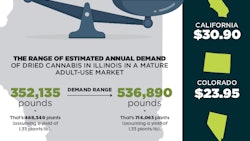
Following the passage of the 2018 Farm Bill and the legalization of hemp in the U.S., federal agencies are beginning to line up their regulatory approach to this burgeoning industry. The U.S. Department of Agriculture (USDA) is preparing its guardrails for state-sanctioned hemp programs, and, now, the United States Patent and Trademark Office (USPTO) has clarified how it will handle trademarks for hemp businesses.
In short, hemp businesses (including plant-touching businesses) are able to apply for trademark registration—as long as their business falls outside the Food and Drug Administration’s (FDA) regulations of hemp-derived CBD as a food or beverage ingredient. The FDA oversight is part of a broad gray area still in need of clarification post-Farm Bill.
For now, many hemp businesses have a shot at claiming their mark.
“We’ve been waiting since the Farm Bill was passed on how that would impact the trademarks used in connection with these particular products and services,” said David Gold, intellectual property litigation attorney at Cole Schotz.
The USPTO, which oversees patents and trademarks, splits its approach to controlled substances in the U.S. The patents office will work with companies that are using federally controlled substances, like whole-plant cannabis (and especially THC). The trademark office, however, will not work with those companies.
"This does not cover a very large segment of the industry. This doesn’t cover anything that’s subject to the FDA."
- David Gold
Now that hemp is no longer listed as a Schedule-I substance, the USPTO is opening the window for trademark applications relating to hemp and hemp-derived compounds. (Hemp is legally defined as the cannabis plant containing less than 0.3-percent THC.)
“Frankly, this is exactly what we anticipated the result would be—down to the language that now needs to be included in the application,” Gold said, referring to the THC content in the company’s hemp material, for instance. The language must mirror the Farm Bill, in other words.
Applications filed after Dec. 20, 2018, will be processed under this new regime. For businesses that filed hemp-related applications before Dec. 20, 2018, “registration will be refused due to the unlawful use or lack of bona fide intent to use in lawful commerce under the CSA.” Those businesses will be told to request an amendment to their applications, which will then be filed with the post-Dec. 20 applications.
“This does not cover a very large segment of the industry,” Gold pointed out. “This doesn’t cover anything that’s subject to the FDA and specifically the FDCA; those are still going to be rejected on their face. That eliminates anything that’s ingested—drinks, edibles, dietary supplements, anything that’s covered by the FDCA [Federal Food, Drug, and Cosmetic Act]. The flip side of that is this is really limited to oils, soaps, lotions, clothing, textiles, anything that’s not governed by [the FDCA].”
Trademarks are use-based, which means that the likely flood of hemp applications at the USPTO must come with a bona-fide intent to use that trademark. The very use of the trademark is the foundation for both the application and the right to that trademark. In fact, companies that have been manufacturing lotions may already have an established trademark; any hemp lotions they produce can be lumped in with that mark. The use remains the same.
“In the United States, we’re not first-to-file, we’re a first-to-use country,” Gold said. “In the sense people have been using [hemp] legally in their state without a federal registration, they do certainly have the rights within that state. They will have priority over anyone else. If someone’s going to start selling under the auspices of Nike or Google, obviously they’re not going to get away with it.”
Another tenet of trademark law is interstate commerce. For the federal government to regulate a trademark, that company must be operating in multiple states. How that requirement intersects with state laws and the ongoing hemp research pilot programs that were first permitted under the 2014 Farm Bill is something that remains to be seen. Already, though, plenty of hemp companies are operating across multiple states.
Whether in trademark law, USDA oversight or self-regulating industry organizations, hemp businesses around the U.S. continue to sort themselves into a more cohesive marketplace.
Looking ahead, though, the bona-fide use behind plant-touching businesses’ trademarks is something to keep in mind. If a company is manufacturing hemp oils and THC-containing oils, let’s say, that company may now have an opportunity to register a trademark for its hemp products. If (some might say when) the U.S. federal government removes cannabis from its list of controlled substances, that company may then expand its trademark to its cannabis products.


























